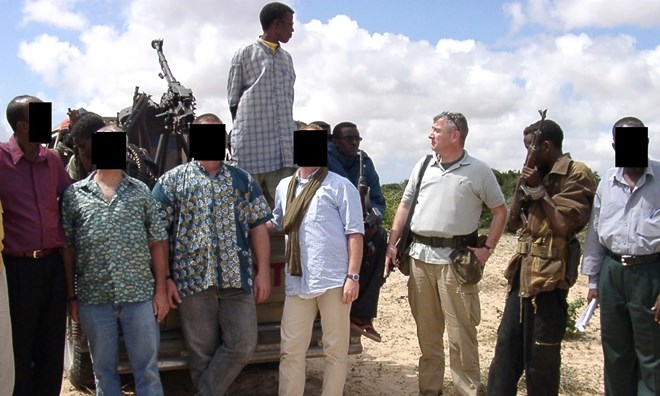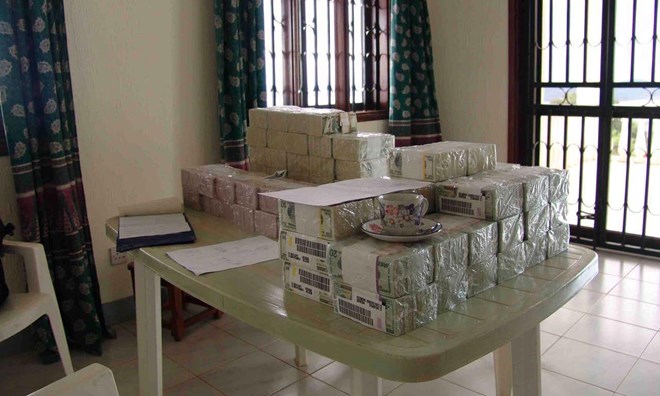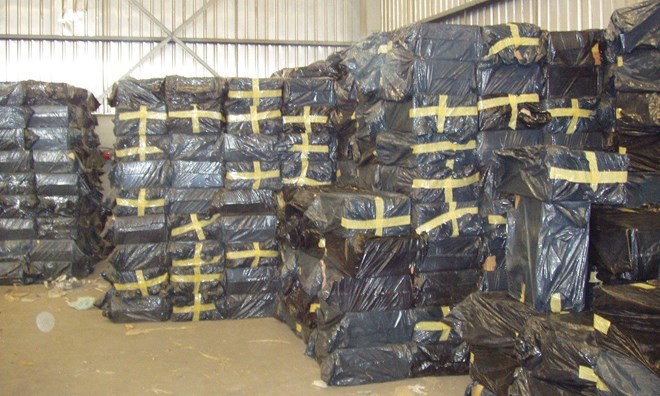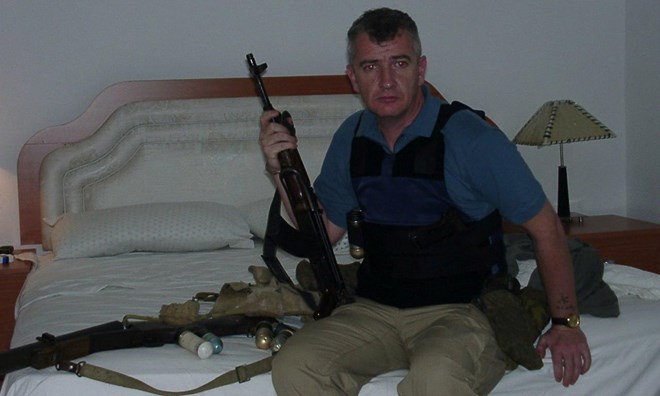
Friday August 18, 2017
Sarah Boseley
Documents show how the world’s largest publicly traded tobacco company pursued growth and profit amid instability in African and Middle East countries

Paul Hopkins and hired gunmen protecting BAT management and local staff in Mogadishu, Somalia. Photograph: Paul Hopkins
British American Tobacco (BAT) has promoted sales of its cigarettes in some of the most fragile, war-torn and unstable countries of Africa and the Middle East, documents seen by the Guardian show.
While civilians were being killed and cities ravaged by violence, BAT pursued opportunities to grow its markets.
The documents describe how cartons of cigarettes were distributed to traders hidden in black bags in Somalia after Al-Shabaab banned sales and threatened punishments under Sharia law between late 2008 and early 2009.
They also show that BAT made plans to launch in South Sudan just two days before it gained independence from the north after years of destruction from a civil war that left 4 million people displaced.
And they tell of a town in eastern DRC that is not on any map, created by BAT to produce and process tobacco leaf, where, according to a whistleblower, millions of dollars were delivered to pay farmers and staff, carried in secretly.
The documents were shown to the Guardian by Paul Hopkins, who was employed by BAT in Africa for 13 years, until he blew the whistle internally on what he describes as unethical conduct; he was later made redundant and left in December 2015. Hopkins tried suing BAT for unfair dismissal but an employment tribunal in London ruled that his employment contract was governed by Kenyan rather than English law preventing him from further pursuing his claim in the UK.
The Serious Fraud Office said earlier this month that it was investigating his allegations.
The details of BAT’s promotion of cigarettes in troubled countries, come as BAT works to raise financing to conclude its purchase of Reynolds American, which will make it the biggest tobacco company in the world. The revelations also follow a Guardian investigation revealing that BAT and other multinationals have used threats against at least eight African nations, demanding they axe or dilute the kind of tobacco control measures that have saved millions of lives in the west.
Hopkins says that fragile states were of interest to BAT, in spite of the practical difficulties and dangers involved in moving cartons of cigarettes and money about.
“If you have no government, you have nobody annoying you about health warnings and nicotine content,” he told the Guardian. “No customs. You basically pay your tax to the local militias on the airfield where you are landing.”
Asked by the Guardian if it had avoided local customs duties and paid cash to local militias, particularly in the DRC, BAT insisted that it observes all “relevant laws and regulations” in the 200 countries in which it operates and that it had pre-paid excise duty to the DRC government.
 One of the smaller cash drops, worth $2.5 million, which Paul Hopkins says was taken over the Ugandan border to the BAT town of Auzi in DRC. Photograph: Paul Hopkins
One of the smaller cash drops, worth $2.5 million, which Paul Hopkins says was taken over the Ugandan border to the BAT town of Auzi in DRC. Photograph: Paul Hopkins
Millions of dollars
Hopkins, a former soldier in the Irish Army’s special forces unit, says he was required on several occasions to take millions of dollars in cash into the DRC. He says it was destined for the town of Auzi in the northeast, unnamed on maps.
Auzi had been built by BAT in the 1950s with a church and a school. It was run by the subsidiary company BAT Leaf. Usually an outside security company took cash into the DRC to pay for the leaf, which was graded in Auzi but then transported through Uganda to Kenya for manufacturing. But while the usual couriers were on leave, Hopkins says he was told to do the run.
“When the weather is not bad, you can drive,” said Hopkins. “It’s about an hour from Arua in Uganda, across wooden bridges and along dirt roads.”
Hopkins has a photograph of a huge stack of notes, totalling $2.5m, that he says he picked up in Kampala and took with him on a Cessna plane that took off from a private airfield outside of the city.
He says he flew to Arua, where a security company employed by BAT supplied him legally with a pistol. Once on the other side of the Congolese border, he said, “I would rent an AK47 for a couple of days.”
But, he said, “your best protection was the 40,000-plus farmers [in eastern Congo]. They didn’t want the rebels to get you because you were carrying their money.” He said he would camouflage the dollars in bags of promotional items, such as BAT hats and pens, which he would give away to the rebels.
In Somalia, the documents show BAT had a strategy to continue selling its cigarettes in spite of warnings by the fundamentalist group Al-Shabaab that it would punish those who sold them under Sharia law.
A slide from a powerpoint presentation from 22 June 2011 says: “Market Assumptions. Somalia. The No-Smoking ultimatum made by Al-Shabaab now in effect. Cigarettes are now a black market commodity. Distribution is being made in black paper bags. This resulted in about 16% decrease in IMS in May, with 1st week of June already 23% down compared to plan.”

A second slide shows pictures of cartons of BAT brands Sportsman and Royals, packed into unidentifiable gunny bags (hessian sacks) and delivered for sale.
Paul Hopkins says BAT brand cigarettes were hidden in plastic in Somalia after al-Shabaab banned sales. Photograph: Paul Hopkins
Hopkins tells of supplying security for the visits of BAT staff to Mogadishu, where they would check the prominence of BAT branded cigarettes on sale in the war-torn city. He has photographs of them posing with local militiamen, hired to protect them.
Somalia is a profitable market for BAT, he says, because people like the more expensive brands. “The whole strategy of the marketing department is to get people smoking cheap brands like Sportsman and migrate them up to the global brands like Dunhill that are more profitable. You go into a market with a value-for-money brand that the poor people can afford,” he said.
That was the strategy in impoverished South Sudan, a new state created after years of war and with millions of people displaced and in dire poverty. Two days before independence was declared on 9 July 2011, BAT met to plan the launch of its cheapest brands in the new state.
“Our strategic intent for this market is to develop sustainable volume initially and the value will come later. The intention is to enter the market with Sportsman and Safari brands which are already widely recognised. The majority of the market is in the Low and Very Low segments,” said the minutes of the Project South Sudan Kick Off Meeting.
A February 2012 document from BAT’s Group Portfolio Management Office – Strategy & Planning stated that the break-even point would be the sale of 75m sticks for year one. “The overriding objective of this project was to enter the South Sudan market in Q4 2011 and establish a viable business model with a consumer relevant brand portfolio that delivers a sustainable month on month organic volume growth with the lowest possible investment,” it says.
In the Middle East also, BAT has nurtured sales in what it describes as “volatile markets” – countries emerging out of war or even in the middle of conflict, like Syria. An October 2011 internal BAT publication called ezine says: “The Middle East continues to deliver outstanding results in a volatile environment. Dunhill has driven strong share growth in the GCC [Gulf Cooperation Council region], and both Iraq and Iran have achieved impressive volume increases…
“In Iraq, [the BAT brand] Kent is growing at a spectacular 80% and consolidating its leading position in the premium segment. In Syria, despite very difficult trading circumstances, Kent has doubled its monthly running rate.”
“For BAT every person is a potential smoker and every country is potentially exploitable. Fragile states are particularly so because the normal rules do not apply, taxes can be avoided, and cigarettes can still be sold profitably. In other words – as long as money can be made, anything goes,” said Anna Gilmore, Professor of Public Health at the University of Bath and UK Centre for Tobacco and Alcohol Studies. “Plus at some point many of the ‘fragile’ markets will formalise. BAT’s aim is generally to get in there early, get smokers addicted to its products before its competitors and, where relevant, get the best deals on local manufacturing options.”

Paul Hopkins in Somalia. COURTESY Paul Hopkins
‘As long as money can be made, anything goes’
Matthew L Myers, president of the Campaign for Tobacco-Free Kids, said: “The allegations against British American Tobacco reflect a company willing to ... exploit any vulnerable population in order to make money – no matter the consequences.
“As cigarette sales decline around the world, British American Tobacco sees fragile states as one of the few remaining growth markets for its deadly products. For a company that doesn’t care how it makes its money or what laws need to be broken to ensure future profits, countries experiencing instability present a unique opportunity.”
The Guardian asked BAT if it had promoted sales of its cigarettes in a number of fragile, war-torn and unstable countries including through under-cover operations, while civil war were ongoing, and if this had allowed them to ignore health warnings and nicotine content.
In a statement, a British American Tobacco spokesperson said:“We take our commitment to the responsible marketing of our products very seriously. We have strict, company-wide marketing principles in place to ensure that our products are marketed responsibly, in addition to adhering to all relevant laws and regulations in the 200 markets where we operate.
“Specifically, we comply fully with the regulations for tobacco products in the DRC – which have been in place in this country since 2007 – that prescribes health warnings and health warning sizes, and sets limits for tar and nicotine content. Additionally, in other African countries, including South Sudan, Somalia and Somaliland, where there is no tobacco regulation in place, we voluntarily apply a side panel health warning on all of our products sold in those markets.
“We fully comply with the relevant tax law in every country in which we operate. Specifically, in DRC, excise on tobacco products is prepaid to the government at the time of ordering excise/tax stamps. This is a process that BAT adheres to strictly for all products it sells in this country.
“In each market where we are present, we offer consumers a choice of products, which can include local brands, international brands and our global drive brands. Our strict international marketing principles apply, and are adhered to, in each of the 200 markets around the world where we operate.”